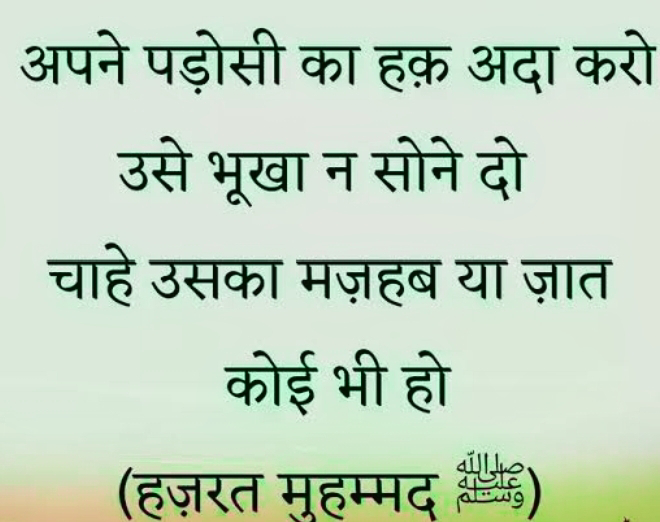Rights of one person over another in Islam. (Haqooq ul Ibad)
ISLAM does not call for EQUALITY... It calls forJUSTICE
In Islam, relationships between individuals are guided by a set of rights and responsibilities. These rights are based on the principles of justice, equality and mutual respect.
However there are many rights that apply to different aspects of human relationships.
we are highlights some Islamic fundamental rights of a person over another person:
Basis of Human Rights in Islam:-
Human rights are fundamental rights in Islam. Islam accepts and institutionalizes the basic principles and rights of life, liberty, security and justice.
Hence there is also more emphasis on punishment for social misdeeds punishment by Muslim low or court like theft, murder, slander, indecency, sexual harassment etc.
Your Spouse's Rights:
Husband-wife relationship is most important after parent-child relationship. The relationship of husband and wife is to become each other's cover and pillar. To support and protect each other and be the best partner. The rights and duties they have towards each other are not entirely unidirectional as is commonly misunderstood and presented. Rather, it applies to both partners. The basic purpose of marital relations is to protect from zina and to improve and strengthen each other in piety.
"After these basic relations, the rights of relatives, neighbors, teachers, orphans etc. form the basis of communal balance and help integrate the society".
Neighbors rights:-
Your neighbor's right in Islam is that you should be his guardian when he is absent, and that you should respect him when he is present, and you should help and support him in both situations.click here to know more
You should not find any fault in him. But if you happen to inadvertently discover a mistake on his part, you should put up a strong defense and cover up about what you know.
"The Prophet mohmmed said. "He is not a true believer who eats his fill while his neighbour is hungry".(No matter what religion your neighbor belongs to)
'ALLAH SAYS:"Muhammad is the Messenger of Allah; and those who are with him are strong against Unbelievers, (but) compassionate amongst each other."(SAHIH BUKHARI)
Haqooq-ul- ibad is also important for improving and building piety as a heart that is mindful of Allah will not neglect fellow creatures.
Teacher's rights:-
Prophet Muhammad (peace be upon him) emphasized the importance of acquiring knowledge and considered teachers to be key figures in society. In Islamic traditions, parents are considered to be the first teachers for their children. However, formal education is also given utmost importance,
The prophet Mohammad ﷺ said:
The seeking of knowledge is obligatory for every Muslim.
(Al Tirmidhi, hadith 74.)
The Prophet Mohammad ﷺ said:
"God, his angels and all those in heavens and on earth, even ants in their hills and fish in the water, call down blessings on those who instruct others in beneficial knowledge"
Al Tirmidhi, Hadith 74
Islam has taught us to respect our teachers as you respect your parents. The status and respect of teachers in our religion Islam is so high that our teachers are given the same status as our parents.
"Prophet Mohammad ﷺ said, "Whoever follows the path in the pursuit of knowledge, Allah will make the path to Paradise easy for him"(Sahih Muslim).
Five Rights of One Muslim on Another:
Hazrat Abu Hurairah RAA mentions that Messenger of Allah SAW said, "Every Muslim has five rights over another Muslim i.e.
(i) reply to Salam,
(ii) visit the sick,
(iii) attend funerals
(iv) accept invitations and
(v) respond to the sneezer
(SAHIH BUKHARI)
Who is the best Muslim:-
Some people asked Allah's Messenger (ﷺ), "Who is the best Muslim? He replied, "One who avoids harming the Muslims with his tongue and hands." And a Muhajir (migrant) is one who leaves what Allah has made haram
The Qur'an and the hadith have laid clear emphasis on the rights of parents, relatives, husband and wife, orphans, teachers, and neighbors.
Our treatment of our parents is most important of all aspects of haqooq-ul-ibad. Our treatment of our parents decides our future. The only instance you are allowed to disobey your parents is if your parent is ordering you to commit shirk, or a crime and go against the tenents of Islam.
Overall it is important to note that these rights are not exhaustive, and other specific rights and responsibilities are also mentioned in Islam. Sermon. The overall principle in Islam is to establish a just and compassionate society where the rights of individuals are protected and respected.










May Allah help us to fulfill the rights of other people
ReplyDelete